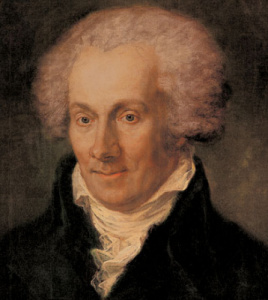“The Cloud Upon the Sanctuary” was one of the first
works of Christian mysticism I've read. I already reviewed it, but why not do
it again? ;-)
The author, Karl von Eckartshausen, was a small time official at the Bavarian court who flourished during the late 18th century. He belonged to the same circle of letters as Lavater, Kirchberger and Saint-Martin, although I'm not sure if the four men ever met. Saint-Martin was, of course, an accomplished esotericist. Eckartshausen's books were at one point very popular in both Bavaria and France, most of them dealing with Catholic piety. Today, they seem mostly forgotten, although A E Waite saved “The Cloud Upon the Sanctuary” for an interested audience.
Eckartshausen's work could be described as a synthesis of traditional Christianity (in its Catholic version) and Gnosticism or Hermeticism (depending on how you define those terms). The author is sometimes placed in the same “Theosophical” tradition as Böhme, the Rosicrucians and Baader. Some of his ideas have a family likeness with Rudolf Steiner's later Anthroposophy, although the evolutionary perspective is less marked and the Christian orthodoxy more so.
To my mind, Eckartshausen sounds mostly “Gnostic”, since he identifies evil with matter. Goodness is identified with “the indestructible substance”, which clearly is spirit. Man fell after partaking of the fruit of the Tree of Good and Evil, in which destructible matter prevailed. At one point, Eckartshausen even says that all humans have a literal material substance in their blood (“gluten”) which makes them evil. He sees man as poisoned by evil, and salvation is therefore about removing the poison from our veins, which will eventually restore our spiritual nature. The Earth itself is also seen as evil.
To save man and the Earth, Jesus Christ had to clothe himself in destructible matter and sacrifice himself, so that his blood could penetrate the bowels of the Earth. The blood of Jesus has gradually healed the interiors of our globe from evil substance ever since. Eckartshausen did have an apocalyptic perspective of sorts, claiming that the time was near when the spiritual substance would reach the surface and transform the Earth, at which point Jesus Christ would return and set up a theocratic rule together with the “elect” of the “inner church” (the secret circles of the mystics). Here, the Bavarian mystic does say that we will become one with Christ not just spiritually but also corporeally, suggesting a less Gnostic and more traditionally Christian notion of glorified matter, but overall, Eckartshausen makes a rather simplistic equation between matter and evil, seeing matter by definition as destructible and the cause of all our base drives, passions and sins.
How can man be saved? The Christian sacraments are important, since the bread and wine communicates the indestructible substance. Otherwise, Eckartshausen envisages a gradual process (Protestant critics would call it “salvation by works”) which starts with simple faith in Jesus and morality, and progressively becomes more and more advanced, until complete certainty is reached, at which point the love and will of man is solely directed towards the divine. This process is presumably connected to deeper and deeper mystical insights.
Eckartshausen claims that Jesus Christ is the only savior, but also has an “inclusivist” streak, since he claims that the mystery of salvation has been given to all nations, but clothed in exoteric symbolism and ritual for the benefit of the less spiritually advanced. It's at least implied that not just the Jews (with Melchizedek) but also the pagan nations (presumably with their mystery religions) had access to this knowledge. Of course, it degenerated over time and finally made necessary the intervention of the real savior himself, Jesus Christ who is the Word and Wisdom of God. It's strongly implied that Jesus had an esoteric teaching, of which the “official” disciples knew little or nothing.
On a side note, Eckartshausen admired Kant, surely a first among esotericists. His point was that Kant had proved that human reason cannot comprehend things eternal and divine, hence necessitating Revelation!
As usual, it's impossible to know when reading an esoteric text how much is the actual esoteric message and how much is an adaptation to whatever exoteric creed the author belongs to. Was Karl von Eckartshausen a genuine Catholic mystic? Or was he a “heretic” who clothed his heterodoxy in as much orthodox garb as he saw fit? And, ultimately, does it matter?
Those questions are left for the reader to ponder.

No comments:
Post a Comment